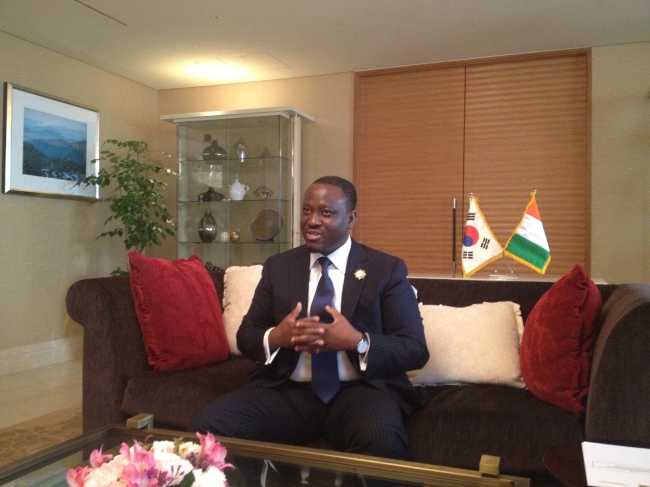The use of United Nations authority during a post-election crisis in West Africa was described by media reports at the time as “bold” and “unprecedented.”
But an Ivorian government official who was actually there characterized the role that the Korean diplomat leading that U.N. Operation in Cote d’Ivoire played in safeguarding democracy there as “instrumental” and “indispensable.”
“The international community gave massive support to the democratic transition in Cote d’Ivoire, and two diplomats in particular played a crucial role: (U.N. Secretary General) Ban Ki-moon and Choi Young-jin,” said Guillaume Kigbafori Soro, the president of Cote d’Ivoire’s National Assembly, on Friday.
But an Ivorian government official who was actually there characterized the role that the Korean diplomat leading that U.N. Operation in Cote d’Ivoire played in safeguarding democracy there as “instrumental” and “indispensable.”
“The international community gave massive support to the democratic transition in Cote d’Ivoire, and two diplomats in particular played a crucial role: (U.N. Secretary General) Ban Ki-moon and Choi Young-jin,” said Guillaume Kigbafori Soro, the president of Cote d’Ivoire’s National Assembly, on Friday.

Choi was handed a mandate by Ban as the Special Representative of the Secretary-General for Cote d’Ivoire to certify the election and make sure the democratically elected president took office.
“I can say on behalf of the people of Cote d’Ivoire that we appreciate this fact very much,” he said during an interview at a hotel in Seoul.
Choi Young-jin led the U.N. Operation in Cote d’Ivoire to bolster democratic elections that voted Laurent Gbagbo out of office in late 2010.
Choi’s certification was a first for the U.N. and the operation he led was considered pivotal in bolstering then President-Elect Alassane Ouattara during the ensuing post-electoral crisis that lasted for months from late 2010 to early 2011.
Choi led the U.N. operation into taking military operations using armored helicopter gunships to prevent embattled Gbagbo forces from continuing to harm civilian populations.
Gbagbo forces even laid siege to the U.N. operation’s headquarters in Abidjan.
“When Cote d’Ivoire faced trouble linked to the electoral process, two important personalities of the United Nations ― two who are also Korean diplomats ― played a indispensable role in supporting democracy,” Soro said.
Air-strikes carried out by the U.N. with the aim of protecting the civilian populations were the first ever in the history of U.N. peacekeeping. Those air strikes brought the Ivorian post-election crisis to a decisive conclusion and bolstered the democratically elected Ouattara.
Soro said he had to visit Korea because of the role played by Korean Foreign Service officers in securing democracy in the months after the November 2010 presidential election, and what he described as the country’s amazing rags-to riches development story. “I had to see the country for myself with my own eyes.”
Soro was in East Asia at the invitation of the Japanese legislature. He arrived in Tokyo on March 22 on a five-day trip and came to Seoul March 27 on what Soro described as a “private trip” staying here for nearly two weeks, meeting with an assortment of corporate VIPs and government officials including Prime Minister Chung Hong-won. He returned to Cote d’Ivoire’s capital city of Abidjan on Sunday.
By Philip Iglauer (ephilip2011@heraldcorp.com)
-
Articles by Korea Herald







![[KH Explains] No more 'Michael' at Kakao Games](http://res.heraldm.com/phpwas/restmb_idxmake.php?idx=644&simg=/content/image/2024/04/28/20240428050183_0.jpg&u=20240428180321)

![[Weekender] How DDP emerged as an icon of Seoul](http://res.heraldm.com/phpwas/restmb_idxmake.php?idx=644&simg=/content/image/2024/04/25/20240425050915_0.jpg&u=)








![[Herald Interview] Mistakes turn into blessings in street performance, director says](http://res.heraldm.com/phpwas/restmb_idxmake.php?idx=652&simg=/content/image/2024/04/28/20240428050150_0.jpg&u=20240428174656)
